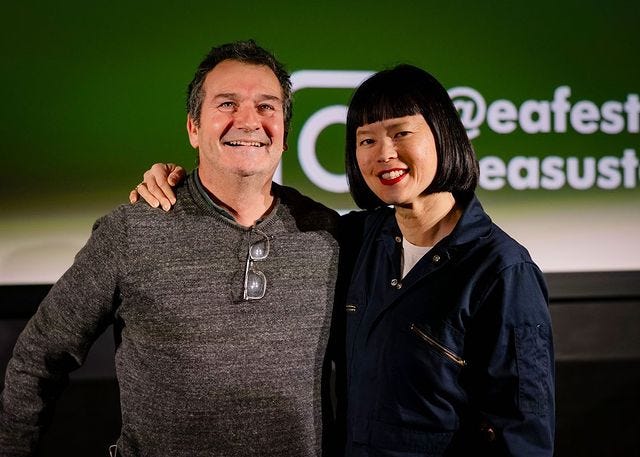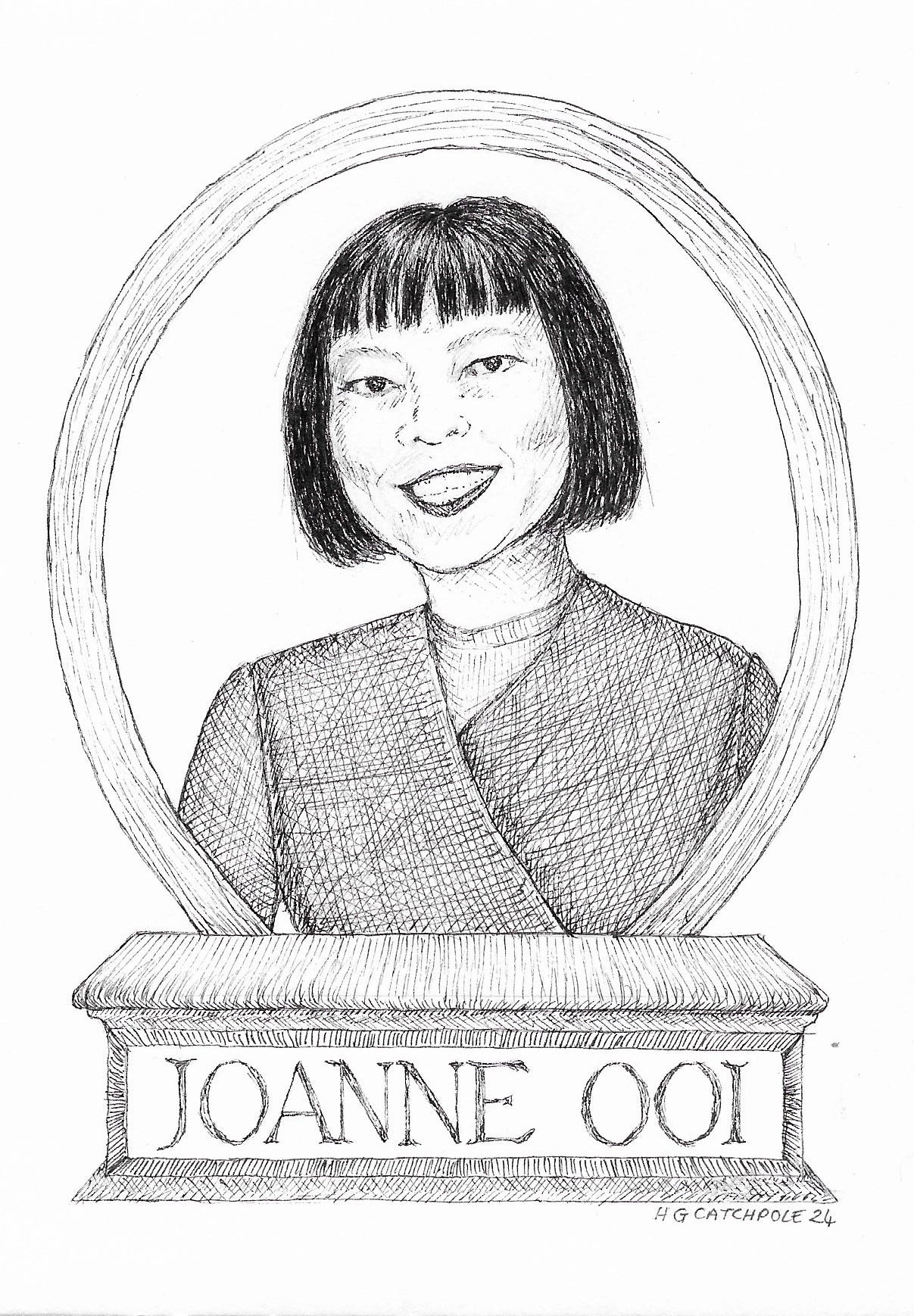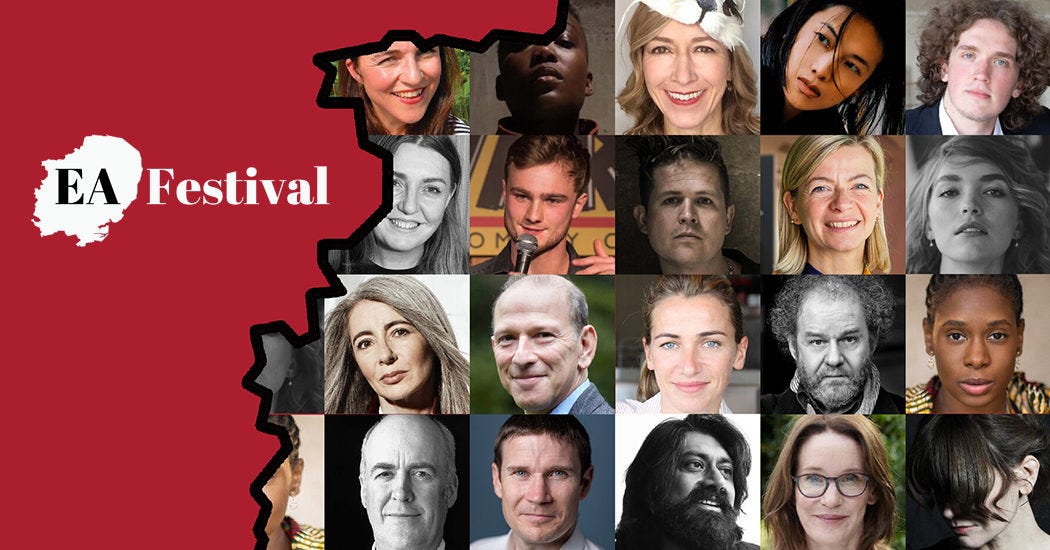Joanne Ooi is the founder of E.A. Festival and, more recently, E.A. Sustain festival. She lives on the border of Essex and Suffolk with her husband.
Joanne, it’s evident you're an unbridled culture vulture, where did your love of culture first start?
It was how I was brought up - I was fed a steady diet of classic world literature. Then my dad went to art house cinema regularly and I played the violin to quite a high level, so one of my greatest loves is actually classical music and it started way back then. I think I was very lucky to be brought up in an unusually highbrow and cultivated environment. I don't think I actually realized the value of what I was exposed to until extremely late in life. A lot of that just subconsciously seeps into your bone marrow and affects your aestheticism and appreciation of art.
You were born in Singapore, grew up in the US, moved to Hong Kong, and now you're on the Suffolk/Essex border.
Which is insane.
Haha yes! So I’m wondering about your move from Hong Kong to East Anglia, that’s quite a jump.
I fell in love with an English barrister who himself had been in Hong Kong for over 40 years. He wanted to retire so we agreed on a time frame that we could both live with.
I was completely maxed out of living in cities because, before I lived in Hong Kong, I lived in New York City. So I had met my quota of urban living ten times over and I have no desire to go back to living in a city because I was becoming very enervated and, to some extent, physically stressed and ill from it.
So love brought me to England and to the particular place where I live.
You have run EA Festival since 2021. What was your inspiration to start it?
When I moved to the countryside in England, I had no social or professional network.
However, I was like a heat seeking missile as to where I wanted to work. There were only two places - either the Aldeburgh Music Festival, or Gainsborough's House - as they struck me as the two main international standard organisations in the region.
But I met with the CEOs, and it was just not going to fit. My core expertise is marketing and I'm incredibly entrepreneurial and on the front foot - this was not the DNA of those organisations at all, at least not at that time. I'm used to doing things at a breakneck pace and in a very dynamic, experimental way, where I'm not really afraid to break things and suffer reversals in order to learn. And these two organisations were very staid. Obviously, they’re extremely successful, but they weren't right for me. So I decided to do my own thing, and I decided to do it because I reckoned that producing an event is much more manageable than running a going concern. So that's what led me to choose the concept and format of a culture festival. Producing a festival is like organising a really big wedding, but in this case, with 25 brides.
“Producing a festival is like organising a really big wedding, but in this case, with 25 brides”
The principles and philosophy of what I’m doing boil down to four things:
Number one - build a great cultural brand.
Number two - propagate the knowledge about how to create great brands, cultural and otherwise. What I perceived when I first moved to the East of England was a conspicuous absence of professional marketing, especially in the creative industries. And that's something that I would like to try to address and, to some extent, redress with what I'm doing.
Number three - I was dismayed to see the lack of cooperation between ecosystem stakeholders and the culture industry in the entire area. Because everyone who runs a cultural organisation knows it's very hard to build and develop audiences. And what better way to do it than to collaborate on marketing and co-produce events - in order to minimise risk. So that's very obvious to anyone who has a shred of commercial common sense in their body. And yet astonishingly it's not an attitude which is common within the cultural sector. So I've actually spent the last three years getting to know as many cultural organisation leaders as I can, and whenever I push on a door and it opens easily (i.e. I find co-operation, collaboration and, in some cases, co-production) I grab it with both hands.
The last of the four principles is - we need to foster more cooperation between art and commerce. So what do I mean? Well to give an example - if you're, say, Maldon Salt, you're an internationally renowned brand, which has a genuine global profile (but is based locally in Essex). Why not do something to commemorate an important anniversary, for example, by commissioning a local art society, or an arts organisation, to create artwork that could be exhibited, then printed on the labeling or packaging. There are countless potential commercial opportunities which are not sussed out or even considered because it's not really a mentality that exists out here.
If you live in a big city, you just do it all the time - it's what I did as creative director of Shanghai Tang. Back in the noughties, we were one of the first luxury fashion brands, alongside Louis Vuitton, to actually start working with contemporary artists. Now it's extremely commonplace.
I always say, ‘who else can I bring into this exercise and how can I cross-pollinate in a fruitful, interesting and fresh way, which is going to benefit all three sides?’ (i.e. the artist, EA, and the consumer).
V&A Museum Director, Tristram Hunt, speaks to Joanne about the future of Museums at Battersea Power Station October 2023, as part of the EA Festival’s ‘Avatars of Style’ series
Culturally, it's also a form of Britishness; to be very reticent about cooperation. To not be on the front foot and get out there, knock on doors and say ‘Hi, I'm Joanne, what are you about? Let me come over and take a look at your studio - maybe there are things that we can do together’. I'm not scared to do things like that, and it’s a mindset I want to propagate, promote and encourage in as many people as I can.
That makes perfect sense, because I have heard you describe your work as ‘development of the connective tissue within creative community’
Yes. Absolutely. And obviously, you can’t nag or hector people into change, so I try to lead by example, by being as giving and generous as I can: If I can engender a connection which is going to be useful for two parties, I'm going to introduce them, whether EA is involved or not. I try to be an energetic hub in that sense.
I love that mindset! Tell me, do you have a vision for EA Festival in five years time?
It's going to be growing a lot out of East Anglia. I'm doing a festival in Albania in September and I'm doing a talk series at the Tate Modern. I'm expecting to expand farther afield outside of East Anglia, but my heart is always going to be here. I'm trying to contribute as much as I can to the local ecosystem.
You know, when you're young, you're actually quite rigid in what you want to accomplish. You think - I'm going to become an artist who's going to show at this gallery within five years, or whatever. Now that I've been in a lot of entrepreneurial situations and, as I’ve gotten older, I think that you need to roll with it. You need to be like a blind person groping around, and you're actually going to have to feel for the contours, as they emerge slowly.
So my vision is that it's a work in progress. I would like to do more events where we live, more regularly. But I'm already making major progress towards that with a full slate of events for the year - including a series with the Food Museum in Stowmarket. And another (annual series) with the Jockey Club Rooms, and it's in this vein that I would like to continue to collaborate with cultural organisations out here.
Looking at your career trajectory (you studied law, cut your teeth distributing for a French shoe designer, resuscitated an ailing luxury fashion brand, gave one of the first TEDx talks on creativity, founded an environmental NGO, launched two culture festivals…) it’s extraordinarily eclectic. What do you think underpins all of these different projects you have worked on?
At the core of any successful person today is the importance of being a great communicator. Whatever industry or trade you're in, because what's life and business really about? It's inspiring confidence in other people to trust you. It's all a form of sales, actually. Whether I'm selling potato chips or a Picasso, it doesn't matter. You have to trust me.
Joanne’s 2011 TedX Talk, discussing creativity, fashion and global technology trends
In every phase of my career, I have thought - what is a new challenge for me, which is adjacent to what I've already done, achieved and succeeded in, where my skill set can be transposed fruitfully? But the new project must contain new challenges which are totally fresh and difficult, yet not so difficult that I won't be able to overcome them.
I always try to do things which have an element of the unknown. So I have always chosen to do the things that no one's ever tried - not just for the sake of it, but because usually what I perceive is a gap in the marketplace. And then I basically hurl myself into that space, and have to feel around like a blind person all over again.
“What's life and business really about? It's inspiring confidence in other people to trust you. It's all a form of sales… whether I'm selling potato chips or a Picasso. It doesn't matter. You have to trust me”.
Lastly, Joanne, how would you like to be remembered?
I think I want to be remembered as a great parent. That's so trite, but in a sense everything that I'm about defies the way that I was brought up and I want to be able to pass that on to my son and other people who come from my profile, which is very specific: I was tiger parented by first generation immigrants and I could have actually become just like my parents, but I've completely rebelled against it and showed how you can espouse values that are very different, and succeed. For example, Asian parents don't want their kids to do anything creative. They want them to be doctors, lawyers, engineers. They want them to make money, and not take huge risks, you know, all the things that I, my whole life, have been about. It's about rebelling against that. Yes. That's very important to me.
I ask each of the interviewees what culture they have been enjoying recently, here are a few of Joanne’s favourite reading recommendations:
FICTION
I have chosen these three fiction books because reading them is like drinking a glass of water:
‘Song of Achilles’ by Madeline Miller - Inside the head of a mythical Greek hero
‘Demon Copperhead’ by Barbara Kingsolver - Challenges of white trash growing up
‘Middle England’ by Jonathan Coe - How I learned about England (without actually living here)
NON-FICTION
‘The Imagination Muscle’ by Albert Read - Lapidary prose. Part how-to guide, part history of creativity
‘Empire of Pain’ by Patrick Radden Keefe - Story of the Sacklers, riveting throughout
‘My Fourth Time, We Drowned’ by Sally Hayden - Harrowing, because it uncovers the complicity of the UNHCR in perpetuating the barbaric conditions of migrant detention camps in Libya and what goes on inside them (torture, rape and murder…)
‘Tomorrow's People’ by Paul Morland - Morland is probably the UK's top demographer and delivers a wake-up call in ten easy chapters - each one dedicated to a major demographic phenomenon. It will change your analytical-political framework permanently
EA Festival 2024 forthcoming events (click to access info):
'Food for Thought Talk' at the Food Museum - 27th April
'The Fall & Rise of the Stately Home' at The Jockey Club Rooms - 30th April
‘The Unlikely Duke’ at The Jockey Club Rooms - 15th May
‘Sing As We Go’ at Essex Book Festival - June 30th
Freedom & Transformation, Albania - September 21-22
Sign up for the EA Festival newsletter here
Follow Joanne on Instagram here and EA Festival here







Both fascinating and inspirational! Joanne demonstrates how to pursue different paths in life with enthusiasm and tenacity.